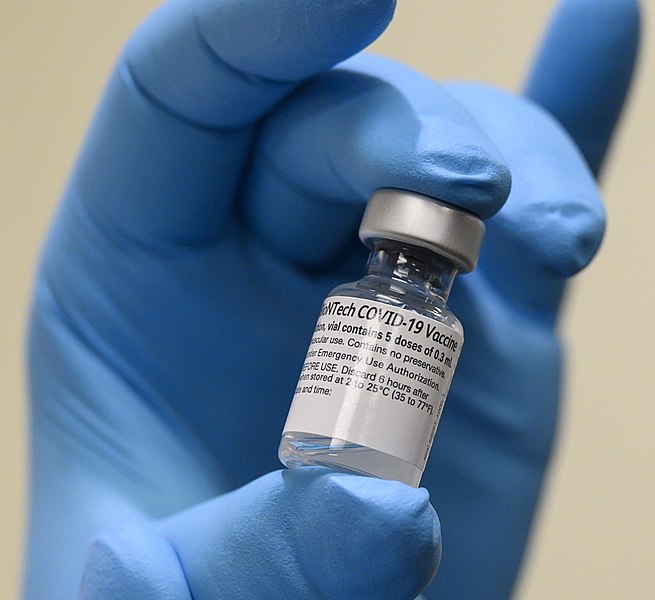Fairfax County begins COVID-19 vaccine rollout
U.S. Army Specialist Angel Laureano holds a vial of the Pfizer-BioNTech COVID-19 vaccine at Walter Reed National Military Medical Center on Dec. 14, 2020. (PHOTO COURTESY OF WIKIMEDIA COMMONS)
February 26, 2021
Fairfax County has begun distributing the COVID-19 vaccine. Registration opened for school staff and teachers on Jan. 16. Individuals can receive the Pfizer-BioNTech or the Moderna vaccines, both requiring two shots, three weeks apart, in the muscle of the upper arm.
Pfizer is an American pharmaceutical company with headquarters in New York, New York. BioNTech is a German biotechnology company with headquarters in Mainze, Germany and another in Cambridge, Massachusetts. The two companies jointly developed the COVID-19 vaccine, with the funding from Pfizer and the development from BioNTech. The Pfizer-BioNTech vaccine was 95% effective in Phase III of clinical trials and received Emergency Use Authorization (EUA) from the Food and Drug Administration on Dec. 11, 2020.
Moderna is an American pharmaceutical biotechnology company based in Cambridge, Massachusetts. The Moderna vaccine was 94.1% effective in Phase III of clinical trials and received an EUA from the FDA on Dec. 18, 2020.
Both the Pfizer-BioNTech and Moderna vaccines are messenger RNA vaccines, a new type of vaccine to protect against infectious diseases. Contrary to other vaccines, the mRNA vaccine does not insert a weakened or inactivated germ into an individual’s body. Instead, according to the Centers for Disease Control and Prevention, the mRNA vaccine provides cells with instructions on how to make a completely harmless piece of the “spike protein,” which is found on the surface of the virus that causes COVID-19.
The immune cells break down the instructions once the construction is complete. The cell then displays the protein piece on its surface, which the immune system recognizes as foreign. The immune system then begins to make antibodies, similar to what happens in a typical immune response to SARS-CoV-2.
At the end of the process, the body has learned how to protect against future SARS-CoV-2 infections.
The mRNA vaccine does not cause COVID-19 and never enters the nucleus of the cell where the DNA is kept. mRNA vaccines have been studied and researched by scientists for decades. Interest in these vaccines arose because they can be developed in a laboratory, making the vaccine development faster than traditional vaccine development. Before, a vaccine would typically take 10-15 years to make and contain a weakened or inactive form of a particular virus so the body could develop an immune response against it. But this time has not been a luxury the world has had and scientists from all over the world were able to work together and safely develop a vaccine with 21st century technology quicker than in previous years.The vaccine went through rigorous and thorough FDA investigation to be authorized for EUA. There are no tracking devices in either vaccine and both Pfizer and BioNTech and Moderna have released the ingredients to the public, which can be found on the FDA website.
Common side-effects of the vaccines include pain, swelling and redness in the area that received the shot, headache and chills and tiredness in the rest of the body.
After receiving the vaccine, individuals must still respect the social distancing guidelines and wear a mask in public areas because the body takes 10 days to develop the antibodies after the first shot. The vaccine is still being investigated to determine whether it can prevent asymptomatic infections, in which an infected individual shows no symptoms but can still transmit the virus.
Fairfax County has divided its vaccine rollout into two phases based on priority, each with their own subcategories of high or low risk professions. As of Jan. 28, the county is only distributing the vaccine to those in Phase 1a and most in Phase 1b.
Individuals in Phase 1a are health care personnel and long-term care facility residents and staff.
Individuals in Phase 1b who are eligible for the vaccine include people who are 65 years old or older, people living in correctional facilities, homeless shelters and migrant labor camps, people who are 16-64 years old with high-risk medical conditions or disabilities, and frontline essential workers, including corrections and homeless shelter workers, police officers, firefighters, hazardous materials removal workers and teachers and school staff.
Individuals in Phase 1b who may not yet be eligible for the vaccine include mail carriers, grocery store workers, public transit workers, food and agriculture workers, and officials needed to maintain continuity of government, such as judges and public facing judicial workers.
Phase 1c includes other essential workers.
Phase 2 includes any remaining Phase 1 populations and individuals who are 16-64 years old without high-risk medical conditions.
Vaccine registration is available for those eligible for the vaccine on the Fairfax County website. The registration form allows eligible individuals to choose the day, time and location to receive the vaccine.
The Virginia Health Department expects to receive 105,000 doses of the vaccine every week, however, supply is still limited and health officials ask for individuals to remain patient as it may be months until some get their appointments.
More information about the Fairfax County vaccine rollout can be found on their website.



